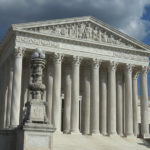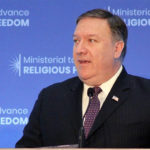WASHINGTON—The U.S. Supreme Court ruled a state program that allows public funds to go toward private education cannot exclude religious schools.
In a 5-4 ruling on Espinoza v. Montana Department of Revenue, the court overturned a Montana Supreme Court decision that had invalidated a state program offering tax credit to people who funded scholarships in private schools, including religious schools.
The Montana Supreme Court ruled the dollar-for-dollar tax-credit program violated a state constitutional provision barring any government financial assistant—direct or indirect—to religious schools. The U.S. Supreme Court reversed the state court’s decision.
Writing the court’s majority opinion, Chief Justice John Roberts cited Trinity Lutheran Church v. Comer. In that 2017 decision, the court ruled Missouri acted improperly when it denied public funds to a church that sought financial assistance from a state program that provided grants for playground improvements.
The common thread connecting the Trinity Lutheran case to the Espinoza case is the denial of a public benefit to an otherwise qualified recipient based solely on religious identity, Roberts argued.
“A state need not subsidize private education. But once the state decides to do so, it cannot disqualify some private schools solely because they are religious,” Roberts wrote.
In a dissent, Justice Stephen Breyer cited not only legal precedents, but also the writings of Thomas Jefferson and James Madison to argue against using taxpayer-supported scholarships to pay for religious education.
“If, for 250 years, we have drawn a line at forcing taxpayers to pay the salaries of those who teach their faith from the pulpit, I do not see how we can today require Montana to adopt a different view respecting those who teach it in the classroom.”
‘Consistent with long-held American principles’
Both supporters and critics of the court’s decision in Espinoza v. Montana cited religious liberty. But some applauded the decision as a clear victory for the free exercise of religion, while others warned that it knocked a hole in the wall of separation protecting freedom of religion and opened the door to government interference in religious schools.
Sign up for our weekly edition and get all our headlines in your inbox on Thursdays

Russell Moore, president of the Southern Baptist Convention’s Ethics & Religious Liberty Commission, said the court “made the right decision,” and its ruling was “consistent with long-held American principles.”
“These scholarships were not a funding of religion, nor an entanglement of the state with the church. The issue here is whether a state-established scholarship program for private schools could discriminate against parents who chose to send their children to private schools that happen to be religious,” Moore said.
“As a Baptist committed to a free church in a free state, and to the separation of church and state, I believe this ruling maintains those right freedoms and boundaries. The Supreme Court should be commended for this decision.”
Kelly Shackelford, president and chief counsel to the Plano-based First Liberty Institute, commended the court for ruling the U.S. Constitution “prevents the government from treating religious organizations and schools unequally.”
“The justices made it clear that states cannot legally discriminate against religious organizations when they perform the same work secular institutions do. This is a victory for religious liberty,” Shackelford said.
Texas Attorney General Ken Paxton similarly hailed the court decision.
“This is a fantastic victory, not just for school choice, but for religious liberty,” Paxton said. “I applaud the Supreme Court for correctly deciding that Montana’s no-aid provision unjustly barred religious schools from public benefits. The intolerant rule, which was based on nothing but religious affiliation, blatantly infringed constitutional religious liberties. Government must respect the closely held religious beliefs of its constituents.”
A ‘pyrrhic victory’ for religious schools
In contrast, Holly Hollman, general counsel for the Baptist Joint Committee for Religious Liberty, expressed disappointment in the court’s ruling. She called it a “pyrrhic victory” for religious schools because it opens them up to government influence and interference.

“The decision’s high concern for equal treatment of religious schools disregards the distinctiveness of religion in our constitutional order and contradicts the special treatment that religion rightfully receives to keep government from influencing and interfering with it,” she said.
“In a shell game that focuses on preventing discrimination based on religious status, the court fails to recognize Montana’s legitimate interest in protecting religious freedom by avoiding funding religious education.
“Though religious schools and some parents who choose them in states that have voucher programs will view today’s decision as a win, they may eventually see that it is a pyrrhic victory. The more that religious schools are treated just like all other private schools, the harder it is to justify and defend the special accommodations they receive, including in their hiring and firing practices, admission policies and curriculum choices.”
Rachel Laser, president and chief executive officer of Americans United for Separation of Church and State, said the Supreme Court “overturned decades of precedent in an effort to privilege certain religious beliefs and have them dominate our civic life.”
“Forcing taxpayers to pay for private religious education—as Montana’s tax-credit voucher program does—is a fundamental violation of their religious freedom,” Laser said. “Because religious schools are the epicenter of religious influence on the next generation, it’s imperative that the members of the faith support those schools, not the taxpayers at large.”

Charles Foster Johnson, executive director of Pastors for Texas Children, called the court’s decision “patently wrong” and “an attack” on religious liberty.
Public money should go to public schools that accept all children—not private religious schools that teach religious convictions, he asserted. By the same token, the “core religious mission” of parochial schools should be protected from government intrusion, he added.
“Let private schools remain private, public schools remain public. Commonsense Americans know this,” Johnson said. “Such wisdom that has sustained our country since its inception escaped the Supreme Court today.”














We seek to connect God’s story and God’s people around the world. To learn more about God’s story, click here.
Send comments and feedback to Eric Black, our editor. For comments to be published, please specify “letter to the editor.” Maximum length for publication is 300 words.